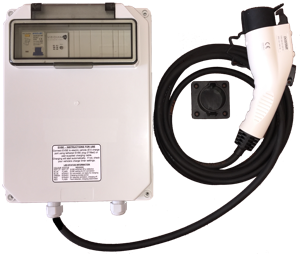Kits are compatible with either a single phase 230VAC, 16 or 32A mains supply or a 3 phase 400/415VAC 16A or 32A mains supply as appropriate to its specification.
If it has a tethered cable and plug it will be supplied with a loose holster appropriate to the tethered plug version. This can then be installed as best suits the location of installation. For example your EVSE may have to be installed in one place but the car (or more importantly its charge socket) may be some metres away. Thus the cable might be left permanently laid out along a building line, for example, and stowed when not in use in a holster near where the EV's charging port will be parked for maximum convenience.
Options
The kit can be enhanced with the following options:
kWh meter – Mounted under the IP44 weather-proof translucent window, this meter will measure the power use of the EVSE over time.
24 hour timer – This will allow the EVSE to switch on for between 1 or more periods so that, for example, the EVSE will only activate during off-peak electricity periods. The EV can be plugged in as soon as it arrives at the EVSE but the EVSE will only turn on and charging commence at the preset times. The timer is pre-set to have one 'on' period of between 0000 and 0700 hours. It should be left on GMT time (as Eco7 tariffs are generally all locked to GMT, ignoring BST) and has a 24 hour backup battery to avoid having to reset the timer after a mains power failure. It is also equipped with a manual override switch, should a charge be needed immediately it is plugged in.
Auxiliary mains supply socket (16A CEE, 13A UK BS1363 or 16A Schuko) – Mounted to the right side of the EVSE box, this socket is only energized when the EVSE is not in use and provides a useful 230VAC supply for general use.
Every kit has thermal protection which will trip if the EVSE's interior temperature exceeds 80 degrees C. Thus, it is important to avoid mounting the unit in direct sunlight, particularly so if it is intended for use during the day. This will also maximize the case and other component's life from the perspective of UV degradation.
An instruction sheet giving full details of how to assemble and wire the EVSE will be emailed with each kit purchase.
Although the modules inside the box (contactor, EPC, RCBO etc) are DIN rail mounted, they will be supplied loose, mounted in bubblewrap to avoid damage to module or DIN rail during transit.
Tools Required
1/ Small posidrive screwdriver ~3-4mm
2/ Medium posidrive screwdriver ~5-6mm
3/ Small adjustable spanner (to tighten Type 2 socket mount nuts or other nuts, if applicable)
4/ Large adjustable spanner - 27mm (to tighten gland nut, if applicable)
5/ Sharp knife or side cutters (to clip zip ties)
6/ Allen key 2.5mm or 3mm (to tighten Type 2 socket mount bolts or other bolts, if applicable)
7/ Small amount of silicone sealant (to mount auxiliary socket to box, if applicable)
Contents
The kit contents are as follows (precise content will vary according to the kit type):-
1/ IP44 Enclosure and mounting kit (stainless steel screws, washers and wallplugs)
2/ Gland nuts for power in and out. Tethered kits come with one plain and one spiral gland. Portable kits have both as spiral.
3/ Wiring harness – pre-cut and terminated with appropriate ferrules etc.
4/ Contactor; 2 pole for single phase or 4 pole for 3 phase.
5/ Viridian Electronic Protocol Controller (EPC) - allows EV to communicate wth EVSE and user (via LED) and controls contactor (plus current control resistor).
6/ RCBO; 2 pole for single phase or 4 pole for 3 phase.
7/ T1 or T2 EV plug and cable set – 5m for tethered kits (shorter or longer options are available)...
or T2 (female) socket – for free cable versions
8/ Holster appropriate to kit type (Note: for free cable kits, these can be added if needed)
9/ Fixing kit (4 x stainless steel wood screws and wallplugs plus rubber sealing washers)
10/ DIN-Mounting Earth Terminal
11/ High temperature cutout (HTC) switch with ‘Fast-on’ connections (spade terminals)
12/ Auxiliary socket and relay (option)
13/ Cable storage hook and mounting kit (fixed tethered kits only)
14/ EV plug storage holster and mounting kit (fixed tethered kits only)
12/ Appropriate vinyl, self adhesive ‘Warning...’ and ‘Instructions for Use’ labels
Component Details
Enclosure (mm): 250W x 375H x 145D (excluding any switch or auxiliary socket)
Plug/Cable Set:
T1 or T2 Plug - Dostar rated at 63ADC, properly crimped to cable
Cable: 16A 1P – 4 core, 2.5mm2 Lineax H07-RNF (rubber sheath)
16A 3P – 7 core, 2.5mm2 Lineax H07-RNF (rubber sheath)
32A 1P – 3G6.0mm2+1G0.5mm2
32A 3P – 5G6.0mm2+1G0.5mm2
All cable tails are terminated with crimped ferrules and have L1, L2, L3, N & CP conductors marked (3P only). E and N conductors conform to standard European colour codes (ie E is green/yellow and N is blue). CP conductor is black.
Weight: Dependent on specific design but as a guide...
Basic ‘free cable’ unit: 2.5kg,
Basic tethered 16A 1P unit: 3.9kg,
Basic tethered 32A 1P unit: 5.1kg
Basic tethered 16A 3P unit: 5.3kg
Basic tethered 32A 3P unit: 7.3kg
RCBO: Combined MCB (miniature circuit breaker; over current protection) and RCD (residual current device; current leakage – typically to earth – protection), Type A (AC and pulsed DC faults).
EPC: (electronic protocol controller) Controls the 230/240VAC contactor to switch on and off the mains supply to your EV according to the IEC 62196 charging standard.








